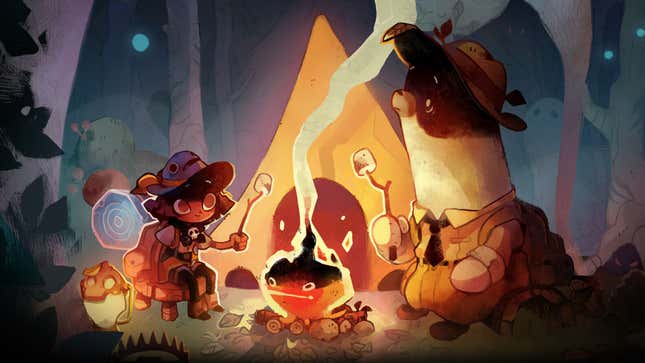
The American healthcare system is so uniquely terrible among developed countries that a localization team translating a recent indie game had to completely replace a line about crowdfunding an emergency medical procedure because it wouldn’t make sense to players outside of the United States.
Cozy Grove, which launched back in April, is a wonderful little simulation game about setting up camp on a charming, haunted island. At some point, one of the several ghosts that you can meet over the course of the game underlines the importance of making friends with a scary hypothetical: “What if you get sick and need to crowdfund your appendectomy?!”
This scenario is, unfortunately, an all-too real reality for many Americans. Despite living in one of the richest countries in the world, more than 1/4 of the campaigns on crowdfunding site GoFundMe between 2010 and 2018 were related to alleviating healthcare costs in the United States, according to a recent study by the American Medical Association.
Additionally, 18% of Americans have donated to a healthcare-related crowdfunding campaign at some point over the last year, social research organization NORC at the University of Chicago reported in April. The study also found that almost 40% of these donations come from households that made less than $60,000 a year.
“People reported that the vast majority of donations were going to campaigns raising money for cancer treatments and accidental injuries,” said Dr. Susan Cahn, a senior research scientist at NORC and co-author of the study. “This information highlights again where gaps in insurance coverage—such as high out-of-pocket costs—may exist and the challenges that Americans with serious illnesses continue to face.”
So when it came time to release Cozy Grove in Spain, a country with public healthcare, a 1:1 translation of the crowdfunding reference wasn’t going to cut it. Instead, the folks at localization studio Native Prime changed the ghostly NPC’s line to a more innocuous statement about keeping friends around in case you need help moving furniture. Native Prime highlighted the adjustment on Twitter back in May, but it was brought to our attention more recently by Cozy Grove co-writer Kris Ligman, who praised the localization and rightfully pointed out how terrible it makes the United States healthcare system look.
“The point of game localization is not just to translate what is said nor ‘erase’ parts of other cultures, but to make players from all countries react the same way a U.S. player would, which in this case is to make them laugh,” Native Prime project manager Isa Gutiérrez explained under the original tweet. “If a Spanish player read, ‘I need friends to pay for my appendectomy,’ they would probably not laugh, they’d be like, ‘Why would I want friends to pay for that?’. That’s why we used a more relatable situation for the Spanish public.”
A rep for Cozy Grove developer Spry Fox told Kotaku via email that the studio gave Native Prime free reign to localize the game as they saw fit.
Since its release, Cozy Grove has attracted both praise in the press and anonymous disparagement for its understandable critiques of capitalism. I’ve yet to play the game much at all myself, but from the little I’ve seen, it’s right on the money when it comes to the woeful inadequacy of American healthcare. This situation serves as another brutal reminder that the modern world has largely solved this problem, and it’s only the United States’ love affair with privatization that keeps those of us who live here under the constant threat of having to choose between death and a life of insurmountable medical debt.

